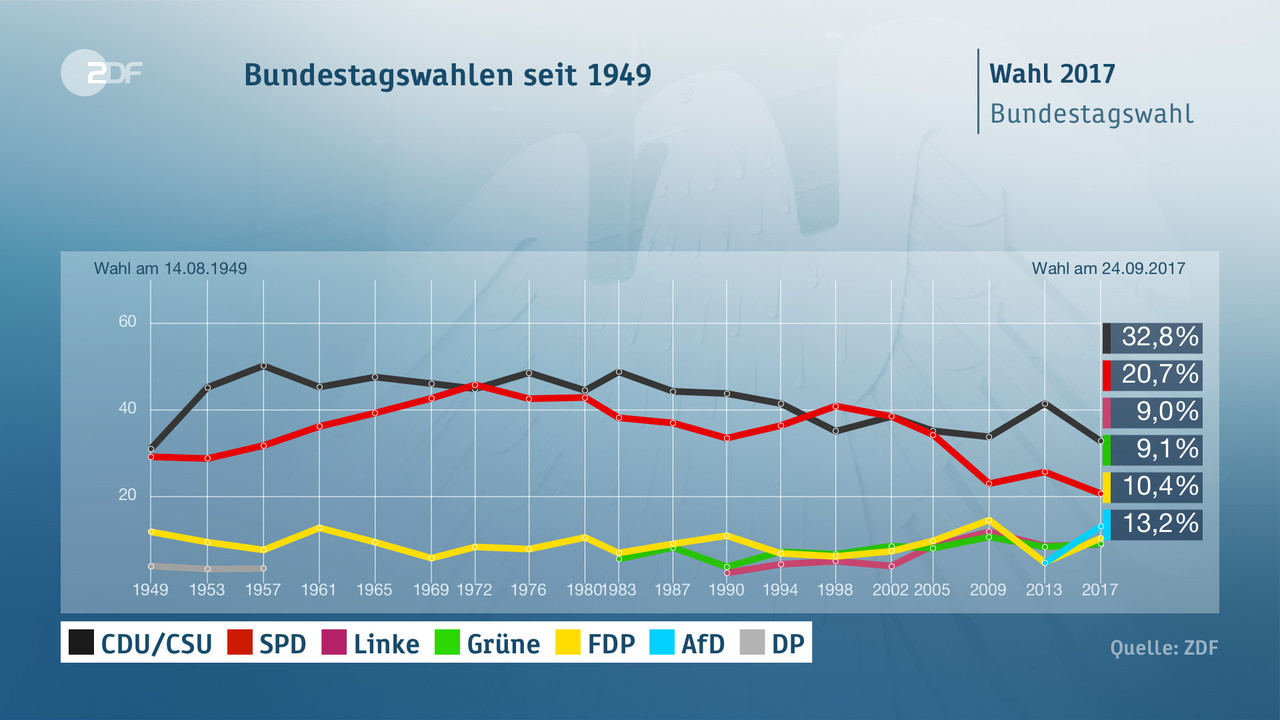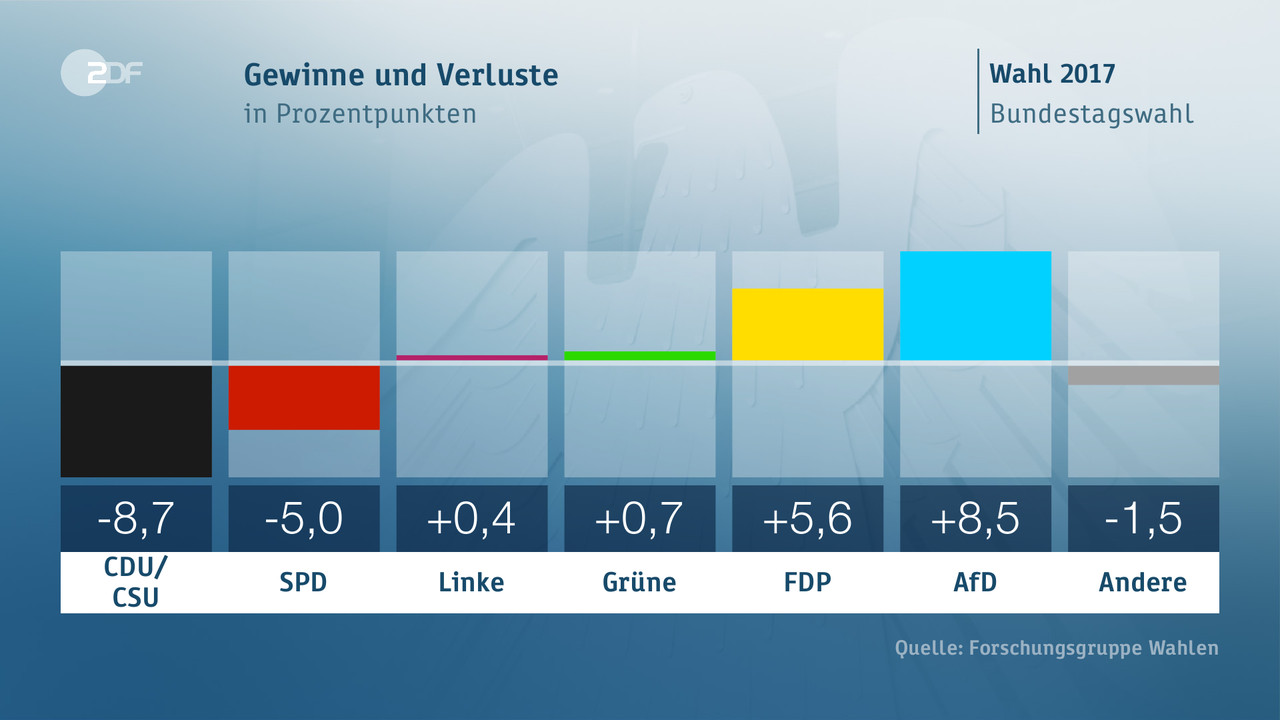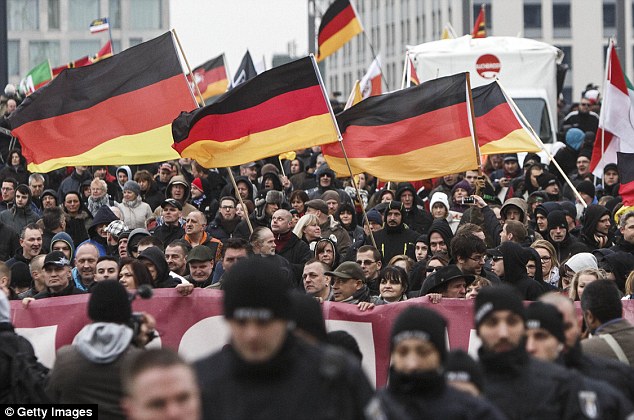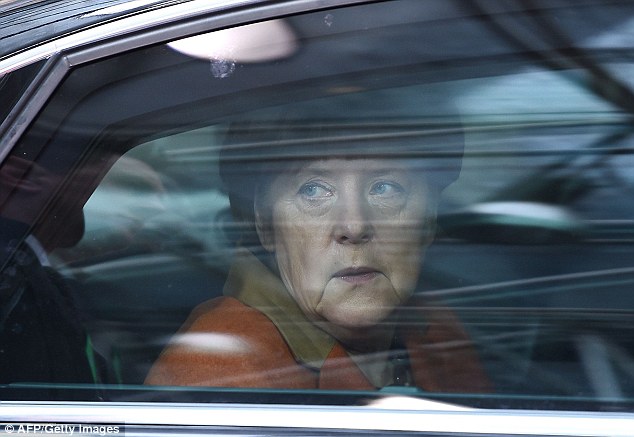The highlight of this weekend was without a doubt the German Federal election, which came at a tumultuous time for the well-established political parties that have been ruling the country ever since the 50’s. In a shocking result that left many baffled, AfD (right-winged, nationalist, anti-immigration) became the third largest party in the Bundestag, with a score that should make everyone ponder about the current status quo of the European continent, while the traditional parties such as Merkel’s CDU/CSU or Schultz’s SPD received the lowest scores in their recent history.
As of now, AfD is the first truly right winged party in the national parliament since the German Right Party won seats in 1949 for only one term.
Results and perspectives
Polls from the German state TV showed that the final results are the following: AfD – 13.3%; CDU/CSU – 32.5%; SPD – 20%; Die Linke – 9.2%; Grune – 8.9%; FDP – 10.7%. While some may think that Merkel’s ruling party won yet again – this is not the case. Compared with the last Federal elections, we can clearly see that CDU/CSU dropped by 8.6%, while SPD dropped by 5.2% (worst results in the postwar era), which makes forming a majority to lead close to impossible. This is further backed by the fact that SPD has just announced that they will sit in the Opposition for the next 4 years, which makes Merkel’s mission even harder – without SPD, the only other grand coalition that can be formed is the “Jamaican flag coalition”, named after the colours of the parties that might be involved in it – CDU-FDP-Grune.

This analysis is the only logical one – after all, most if not all political parties in Germany have vowed not to govern alongside AfD, accusing them of harbouring “neo-Nazi” elements and running a “hatred-oriented” anti-immigration campaign. However, the Jamaican flag coalition is already showing the volatility of the German politics: Grune’s and FDP’s platforms are in total contradiction one to another, while CDU/CSU will be focusing on regaining their lost conservative voters by adopting a more centre-right platform – mainly by adopting a harsher stance when it comes to immigration. A grand coalition of different ideas or just another compromise?
The final results clearly show that the German electorate feels disenfranchised and unrepresented by the traditional parties – it comes to no surprise to the ones that actually paid attention that AfD received two-thirds of the SPD vote and 40% of the CDU/CSU vote. Moreover, AfD got 1.2 million votes from past non-voters, while CDU/CSU received 1 million votes and SPD 500.000 votes. In many ways, this can roughly be translated into an anti-Merkel vote, reflecting the opposition of many to her controversial politic of allowing more than a million refugees in Germany over the course of the past two years. This is further enhanced by the fact that when asked, 60% of the AfD voters replied that they voted” against all other parties”, while only 34% of them said that they voted out of conviction for AfD.

In short, we can clearly see that the support for AfD does not stem from an actual likability of the party itself – it comes from an opposition to all the other parties. The German people casted a vote against a political establishment that they see as not representing them anymore. They casted a vote against political parties that have been moving away from their core beliefs – especially in the case of the once-conservative Christian CDU/CSU. After all, more than 70% of Germans said that it would be good if they could vote for CSU outside of Bavaria – CSU being much more conservative and right-winged than Merkel’s CDU.
The act of rebellion
While the mainstream media hysteria is running rampant across the world – by calling AfD a “far-right” party – we must look at these results without pondering to our emotions about the “left” or the “right”. Populist right-winged parties peaked in the polls in 2016, at the height of the refugee crisis – as we have seen in the likes of the Dutch Freedom party or the French Front National. However, these political parties have managed to receive so much support from the public mainly because more and more people feel like the current establishment is not doing enough – in some cases, nothing at all – to cater to their needs. The immigration aspect, an increase in crimes and violence across the continent, economic instability and constant terrorist threats – these are the topics that the main political parties have decided to either ignore or simply brush aside as “little things” – or, as London’s mayor said: “a part and parcel of living in an European environment”.

Such is the case for Germany as well – and this vote for AfD is the same anti-establishment vote that the Britons gave for Ukip or the Dutch gave for the Dutch Freedom party. It’s a simple pattern that pretty much tells us the following – as long as the leading political parties will choose to ignore the real problems of the people, the later will vote accordingly against them. Moreover, if the mainstream media keeps on alienating the right-winged voters by calling them “neo-Nazis”, even if they are not at all affiliated with any radical groups, the people will further slip in the extremes – as seen in the US, where the “Naziphilia” has reached an unseen level of insanity for the left.
There is no question about it – German politics have just experienced a true wake-up call. If the leading parties don’t adjust their politics in order to regain their followers, more and more people will fall towards political entities that verge on the extremes – be them left or right. The ticking on the clock has just started for the German politicians – the next 4 years will not only be crucial, but they will define the shape of our continent. AfD will most likely form the opposition alongside SPD, and with their 88 seats in the Bundestag, they will call out every single move that Merkel’s coalition will make – a continuous scrutiny that will test the nerves of many.
“
We’re going to chase down Frau Merkel (Chancellor Angela Merkel) and whoever else gets in our way until we get back our country”, AfD co-founder and co-chairman Alexander Gauland said after the exit polls were released last night.
The game starts as of now. Let’s just hope that all sides remember for whom they are working for – the volk.
 This analysis is the only logical one – after all, most if not all political parties in Germany have vowed not to govern alongside AfD, accusing them of harbouring “neo-Nazi” elements and running a “hatred-oriented” anti-immigration campaign. However, the Jamaican flag coalition is already showing the volatility of the German politics: Grune’s and FDP’s platforms are in total contradiction one to another, while CDU/CSU will be focusing on regaining their lost conservative voters by adopting a more centre-right platform – mainly by adopting a harsher stance when it comes to immigration. A grand coalition of different ideas or just another compromise?
The final results clearly show that the German electorate feels disenfranchised and unrepresented by the traditional parties – it comes to no surprise to the ones that actually paid attention that AfD received two-thirds of the SPD vote and 40% of the CDU/CSU vote. Moreover, AfD got 1.2 million votes from past non-voters, while CDU/CSU received 1 million votes and SPD 500.000 votes. In many ways, this can roughly be translated into an anti-Merkel vote, reflecting the opposition of many to her controversial politic of allowing more than a million refugees in Germany over the course of the past two years. This is further enhanced by the fact that when asked, 60% of the AfD voters replied that they voted” against all other parties”, while only 34% of them said that they voted out of conviction for AfD.
This analysis is the only logical one – after all, most if not all political parties in Germany have vowed not to govern alongside AfD, accusing them of harbouring “neo-Nazi” elements and running a “hatred-oriented” anti-immigration campaign. However, the Jamaican flag coalition is already showing the volatility of the German politics: Grune’s and FDP’s platforms are in total contradiction one to another, while CDU/CSU will be focusing on regaining their lost conservative voters by adopting a more centre-right platform – mainly by adopting a harsher stance when it comes to immigration. A grand coalition of different ideas or just another compromise?
The final results clearly show that the German electorate feels disenfranchised and unrepresented by the traditional parties – it comes to no surprise to the ones that actually paid attention that AfD received two-thirds of the SPD vote and 40% of the CDU/CSU vote. Moreover, AfD got 1.2 million votes from past non-voters, while CDU/CSU received 1 million votes and SPD 500.000 votes. In many ways, this can roughly be translated into an anti-Merkel vote, reflecting the opposition of many to her controversial politic of allowing more than a million refugees in Germany over the course of the past two years. This is further enhanced by the fact that when asked, 60% of the AfD voters replied that they voted” against all other parties”, while only 34% of them said that they voted out of conviction for AfD.
 In short, we can clearly see that the support for AfD does not stem from an actual likability of the party itself – it comes from an opposition to all the other parties. The German people casted a vote against a political establishment that they see as not representing them anymore. They casted a vote against political parties that have been moving away from their core beliefs – especially in the case of the once-conservative Christian CDU/CSU. After all, more than 70% of Germans said that it would be good if they could vote for CSU outside of Bavaria – CSU being much more conservative and right-winged than Merkel’s CDU.
The act of rebellion
While the mainstream media hysteria is running rampant across the world – by calling AfD a “far-right” party – we must look at these results without pondering to our emotions about the “left” or the “right”. Populist right-winged parties peaked in the polls in 2016, at the height of the refugee crisis – as we have seen in the likes of the Dutch Freedom party or the French Front National. However, these political parties have managed to receive so much support from the public mainly because more and more people feel like the current establishment is not doing enough – in some cases, nothing at all – to cater to their needs. The immigration aspect, an increase in crimes and violence across the continent, economic instability and constant terrorist threats – these are the topics that the main political parties have decided to either ignore or simply brush aside as “little things” – or, as London’s mayor said: “a part and parcel of living in an European environment”.
In short, we can clearly see that the support for AfD does not stem from an actual likability of the party itself – it comes from an opposition to all the other parties. The German people casted a vote against a political establishment that they see as not representing them anymore. They casted a vote against political parties that have been moving away from their core beliefs – especially in the case of the once-conservative Christian CDU/CSU. After all, more than 70% of Germans said that it would be good if they could vote for CSU outside of Bavaria – CSU being much more conservative and right-winged than Merkel’s CDU.
The act of rebellion
While the mainstream media hysteria is running rampant across the world – by calling AfD a “far-right” party – we must look at these results without pondering to our emotions about the “left” or the “right”. Populist right-winged parties peaked in the polls in 2016, at the height of the refugee crisis – as we have seen in the likes of the Dutch Freedom party or the French Front National. However, these political parties have managed to receive so much support from the public mainly because more and more people feel like the current establishment is not doing enough – in some cases, nothing at all – to cater to their needs. The immigration aspect, an increase in crimes and violence across the continent, economic instability and constant terrorist threats – these are the topics that the main political parties have decided to either ignore or simply brush aside as “little things” – or, as London’s mayor said: “a part and parcel of living in an European environment”.
 Such is the case for Germany as well – and this vote for AfD is the same anti-establishment vote that the Britons gave for Ukip or the Dutch gave for the Dutch Freedom party. It’s a simple pattern that pretty much tells us the following – as long as the leading political parties will choose to ignore the real problems of the people, the later will vote accordingly against them. Moreover, if the mainstream media keeps on alienating the right-winged voters by calling them “neo-Nazis”, even if they are not at all affiliated with any radical groups, the people will further slip in the extremes – as seen in the US, where the “Naziphilia” has reached an unseen level of insanity for the left.
There is no question about it – German politics have just experienced a true wake-up call. If the leading parties don’t adjust their politics in order to regain their followers, more and more people will fall towards political entities that verge on the extremes – be them left or right. The ticking on the clock has just started for the German politicians – the next 4 years will not only be crucial, but they will define the shape of our continent. AfD will most likely form the opposition alongside SPD, and with their 88 seats in the Bundestag, they will call out every single move that Merkel’s coalition will make – a continuous scrutiny that will test the nerves of many.
“We’re going to chase down Frau Merkel (Chancellor Angela Merkel) and whoever else gets in our way until we get back our country”, AfD co-founder and co-chairman Alexander Gauland said after the exit polls were released last night.
The game starts as of now. Let’s just hope that all sides remember for whom they are working for – the volk.
Such is the case for Germany as well – and this vote for AfD is the same anti-establishment vote that the Britons gave for Ukip or the Dutch gave for the Dutch Freedom party. It’s a simple pattern that pretty much tells us the following – as long as the leading political parties will choose to ignore the real problems of the people, the later will vote accordingly against them. Moreover, if the mainstream media keeps on alienating the right-winged voters by calling them “neo-Nazis”, even if they are not at all affiliated with any radical groups, the people will further slip in the extremes – as seen in the US, where the “Naziphilia” has reached an unseen level of insanity for the left.
There is no question about it – German politics have just experienced a true wake-up call. If the leading parties don’t adjust their politics in order to regain their followers, more and more people will fall towards political entities that verge on the extremes – be them left or right. The ticking on the clock has just started for the German politicians – the next 4 years will not only be crucial, but they will define the shape of our continent. AfD will most likely form the opposition alongside SPD, and with their 88 seats in the Bundestag, they will call out every single move that Merkel’s coalition will make – a continuous scrutiny that will test the nerves of many.
“We’re going to chase down Frau Merkel (Chancellor Angela Merkel) and whoever else gets in our way until we get back our country”, AfD co-founder and co-chairman Alexander Gauland said after the exit polls were released last night.
The game starts as of now. Let’s just hope that all sides remember for whom they are working for – the volk.








